(全英文论文)从中西方文化差异分析动物习语十二生肖
- 格式:doc
- 大小:65.50 KB
- 文档页数:11
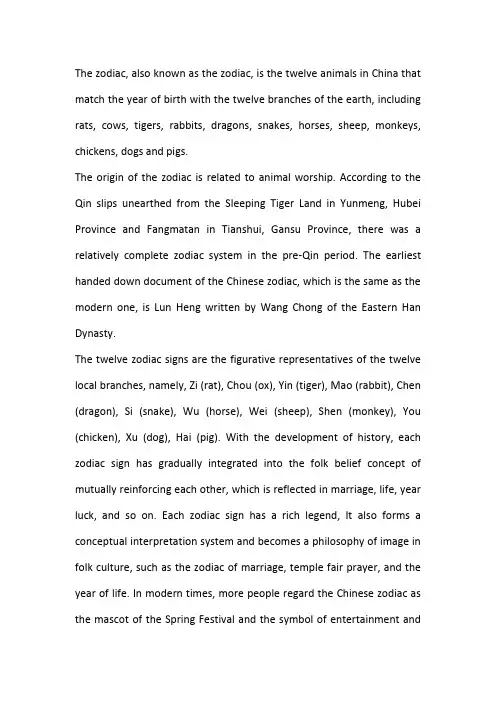
The zodiac, also known as the zodiac, is the twelve animals in China that match the year of birth with the twelve branches of the earth, including rats, cows, tigers, rabbits, dragons, snakes, horses, sheep, monkeys, chickens, dogs and pigs.The origin of the zodiac is related to animal worship. According to the Qin slips unearthed from the Sleeping Tiger Land in Yunmeng, Hubei Province and Fangmatan in Tianshui, Gansu Province, there was a relatively complete zodiac system in the pre-Qin period. The earliest handed down document of the Chinese zodiac, which is the same as the modern one, is Lun Heng written by Wang Chong of the Eastern Han Dynasty.The twelve zodiac signs are the figurative representatives of the twelve local branches, namely, Zi (rat), Chou (ox), Yin (tiger), Mao (rabbit), Chen (dragon), Si (snake), Wu (horse), Wei (sheep), Shen (monkey), You (chicken), Xu (dog), Hai (pig). With the development of history, each zodiac sign has gradually integrated into the folk belief concept of mutually reinforcing each other, which is reflected in marriage, life, year luck, and so on. Each zodiac sign has a rich legend, It also forms a conceptual interpretation system and becomes a philosophy of image in folk culture, such as the zodiac of marriage, temple fair prayer, and the year of life. In modern times, more people regard the Chinese zodiac as the mascot of the Spring Festival and the symbol of entertainment andcultural activities.As a time-honored folk cultural symbol, the Chinese zodiac has left a large number of poems, couplets, paintings, calligraphy and paintings and folk arts and crafts that depict the image and symbolic significance of the Chinese zodiac. In addition to China, many countries around the world issue stamps on the Chinese zodiac during the Spring Festival to express their wishes for the Chinese New Year.十二生肖,又叫属相,是中国与十二地支相配以人出生年份的十二种动物,包括鼠、牛、虎、兔、龙、蛇、马、羊、猴、鸡、狗、猪。
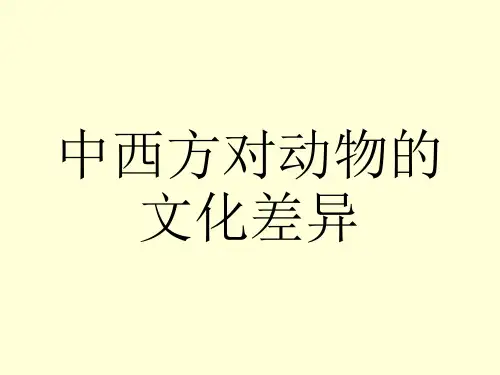
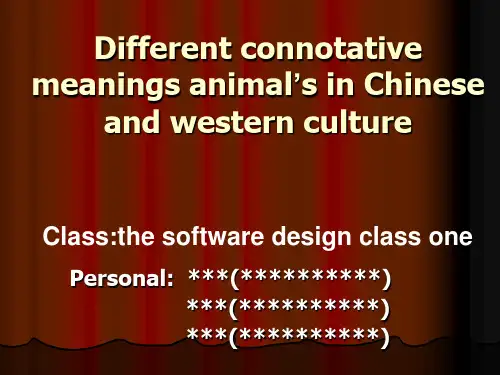
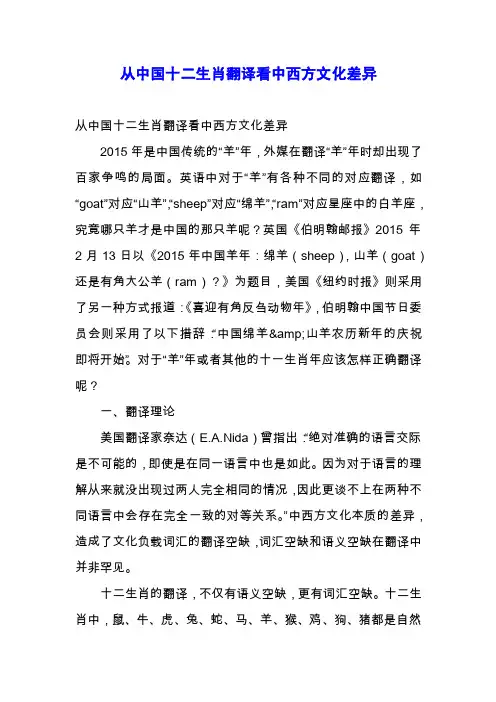
从中国十二生肖翻译看中西方文化差异从中国十二生肖翻译看中西方文化差异2015年是中国传统的“羊”年,外媒在翻译“羊”年时却出现了百家争鸣的局面。
英语中对于“羊”有各种不同的对应翻译,如“goat”对应“山羊”,“sheep”对应“绵羊”,“ram”对应星座中的白羊座,究竟哪只羊才是中国的那只羊呢?英国《伯明翰邮报》2015年2月13日以《2015年中国羊年:绵羊(sheep),山羊(goat)还是有角大公羊(ram)?》为题目,美国《纽约时报》则采用了另一种方式报道:《喜迎有角反刍动物年》,伯明翰中国节日委员会则采用了以下措辞:“中国绵羊&山羊农历新年的庆祝即将开始”。
对于“羊”年或者其他的十一生肖年应该怎样正确翻译呢?一、翻译理论美国翻译家奈达(E.A.Nida)曾指出:“绝对准确的语言交际是不可能的,即使是在同一语言中也是如此。
因为对于语言的理解从来就没出现过两人完全相同的情况,因此更谈不上在两种不同语言中会存在完全一致的对等关系。
”中西方文化本质的差异,造成了文化负载词汇的翻译空缺,词汇空缺和语义空缺在翻译中并非罕见。
十二生肖的翻译,不仅有语义空缺,更有词汇空缺。
十二生肖中,鼠、牛、虎、兔、蛇、马、羊、猴、鸡、狗、猪都是自然界真实存在的生物,但是龙从诞生之日起便作为中华民族的图腾存在,其真实性暂不可考,英语中并没有与之相对应的词汇,所以对于十二生肖翻译的争议与分歧一直存在。
二、十二生肖的文化含义及其翻译1.鼠年。
鼠在英文中有“mouse”和“rat”,“mouse”是“small rodent with a long thin tail”(长尾小鼠),而“rat”是“rodent that looks like,but is larger than,a mouse”(长尾大鼠),体型上“rat”要比“mouse”大,中国文化中的“鼠”一般来指代家里的鼠,体型较小,与“mouse”相符。
![从动物习语看中西文化差异英语专业毕业论文[管理资料]](https://uimg.taocdn.com/f14444be2e3f5727a4e96261.webp)
从动物习语看中西文化差异[Abstract] Language is a cultural carrier. Culture-loaded vocabulary plays an important role in a language. Different social backgrounds and national cultures have a great effect on the cultural connotations of vocabulary. Animals are friends of human beings. Languages of most nations contain a lot of words denoting animals, and so do Chinese and English. Along with the development and progress of human society, many animals are tamed to become domestic animals serving people, and many others have become people’s pets. So animals have become part of people’s life. Animal idioms gradually have got their established connotations in all languages. That is, people associate their feelings and emotions, even happenings and natural phenomena with various animals, which are thought to present different characters like people, or serve as symbols. Many animals have become a kind of symbol in people’s thinking and this symbol is reflected in the language. However, because of different history and culture, the connotations of animal words in one language do not necessarily coincide with those in another because of different outlook of life and concept of beauty in different cultures.This dissertation attempts to compare the similarities and differences of animal idioms, the causes for differences and the translation methods of dealing with cultural differences. Therefore, we can not only better master and use the animal idioms accurately, but also understand the eastern and western cultures, promoting the cross-cultural communication and translation practice.Chapter one is the introduction dealing with the relationship between the language and culture.Chapter two makes a comparison of similarities and differences in animal words’ meanings of idioms. Owning to the different social backgrounds, customs and religions, differences are bound to appear in animal idiomsin both languages. When talking about the differences, I compare the animal terms in Chinese and English idioms according to the connotative meaning, affective meaning and reflected meaning. I also talk about the meaning gap in Chinese and in English.Chapter three focuses on the analysis of the causes for the differences from the following aspects: influence of region, influence of convention, influence of religion, influence of history, influence of fables and mythologies and influence of borrowed language and foreign language. Chapter four deals primarily with the methods of dealing with cultural differences from five translation methods: literal translation, free translation, image-shift translation, literal translation plus annotation and literal plus free translation.【摘要】语言是文化的载体,作为文化载体的词汇在语言中扮演重要的角色。
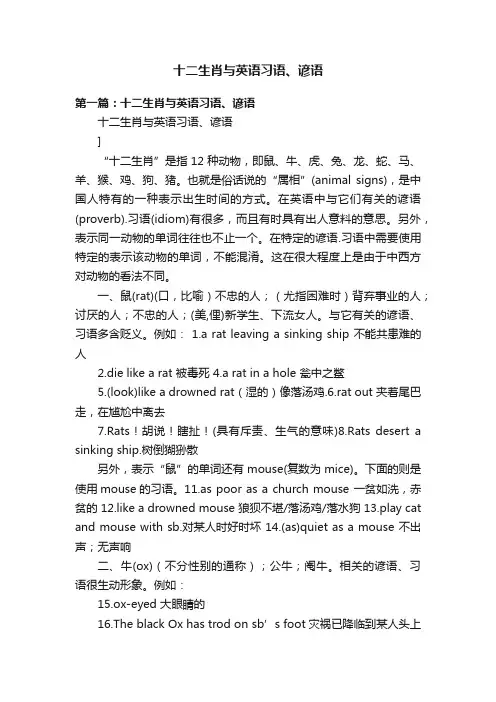
十二生肖与英语习语、谚语第一篇:十二生肖与英语习语、谚语十二生肖与英语习语、谚语]“十二生肖”是指12种动物,即鼠、牛、虎、兔、龙、蛇、马、羊、猴、鸡、狗、猪。
也就是俗话说的“属相”(animal signs),是中国人特有的一种表示出生时间的方式。
在英语中与它们有关的谚语(proverb).习语(idiom)有很多,而且有时具有出人意料的意思。
另外,表示同一动物的单词往往也不止一个。
在特定的谚语.习语中需要使用特定的表示该动物的单词,不能混淆。
这在很大程度上是由于中西方对动物的看法不同。
一、鼠(rat)(口,比喻)不忠的人;(尤指困难时)背弃事业的人;讨厌的人;不忠的人;(美,俚)新学生、下流女人。
与它有关的谚语、习语多含贬义。
例如: 1.a rat leaving a sinking ship 不能共患难的人2.die like a rat 被毒死 4.a rat in a hole 瓮中之鳖5.(look)like a drowned rat(湿的)像落汤鸡.6.rat out 夹着尾巴走,在尴尬中离去7.Rats!胡说!瞎扯!(具有斥责、生气的意味)8.Rats desert a sinking ship.树倒猢狲散另外,表示“鼠”的单词还有mouse(复数为mice)。
下面的则是使用mouse的习语。
11.as poor as a church mouse 一贫如洗,赤贫的 12.like a drowned mouse 狼狈不堪/落汤鸡/落水狗 13.play cat and mouse with sb.对某人时好时坏 14.(as)quiet as a mouse 不出声;无声响二、牛(ox)(不分性别的通称);公牛;阉牛。
相关的谚语、习语很生动形象。
例如:15.ox-eyed 大眼睛的16.The black Ox has trod on sb’s foot灾祸已降临到某人头上/某人已人老珠黄而bull则表示“公牛”。
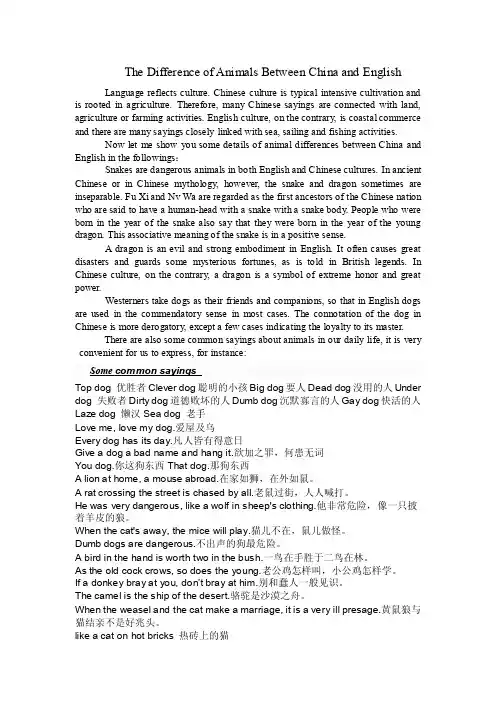
The Difference of Animals Between China and English Language reflects culture. Chinese culture is typical intensive cultivation and is rooted in agriculture. Therefore, many Chinese sayings are connected with land, agriculture or farming activities. English culture, on the contrary, is coastal commerce and there are many sayings closely linked with sea, sailing and fishing activities.Now let me show you some details of animal differences between China and English in the followings:Snakes are dangerous animals in both English and Chinese cultures. In ancient Chinese or in Chinese mythology, however, the snake and dragon sometimes are inseparable. Fu Xi and Nv Wa are regarded as the first ancestors of the Chinese nation who are said to have a human-head with a snake with a snake body. People who were born in the year of the snake also say that they were born in the year of the young dragon. This associative meaning of the snake is in a positive sense.A dragon is an evil and strong embodiment in English. It often causes great disasters and guards some mysterious fortunes, as is told in British legends. In Chinese culture, on the contrary, a dragon is a symbol of extreme honor and great power.Westerners take dogs as their friends and companions, so that in English dogs are used in the commendatory sense in most cases. The connotation of the dog in Chinese is more derogatory, except a few cases indicating the loyalty to its master.There are also some common sayings about animals in our daily life, it is very convenient for us to express, for instance:Top dog 优胜者Clever dog聪明的小孩Big dog要人Dead dog没用的人Under dog 失败者Dirty dog道德败坏的人Dumb dog沉默寡言的人Gay dog快活的人Laze dog 懒汉Sea dog 老手Love me, love my dog.爱屋及乌Every dog has its day.凡人皆有得意日Give a dog a bad name and hang it.欲加之罪,何患无词You dog.你这狗东西That dog.那狗东西A lion at home, a mouse abroad.在家如狮,在外如鼠。
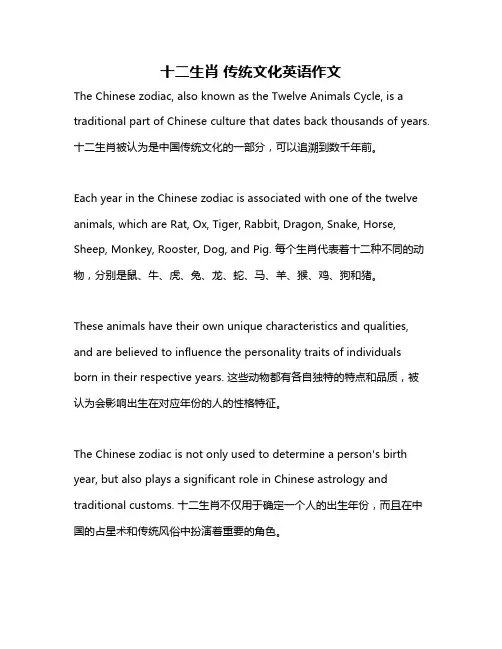
十二生肖传统文化英语作文The Chinese zodiac, also known as the Twelve Animals Cycle, is a traditional part of Chinese culture that dates back thousands of years. 十二生肖被认为是中国传统文化的一部分,可以追溯到数千年前。
Each year in the Chinese zodiac is associated with one of the twelve animals, which are Rat, Ox, Tiger, Rabbit, Dragon, Snake, Horse, Sheep, Monkey, Rooster, Dog, and Pig. 每个生肖代表着十二种不同的动物,分别是鼠、牛、虎、兔、龙、蛇、马、羊、猴、鸡、狗和猪。
These animals have their own unique characteristics and qualities, and are believed to influence the personality traits of individuals born in their respective years. 这些动物都有各自独特的特点和品质,被认为会影响出生在对应年份的人的性格特征。
The Chinese zodiac is not only used to determine a person's birth year, but also plays a significant role in Chinese astrology and traditional customs. 十二生肖不仅用于确定一个人的出生年份,而且在中国的占星术和传统风俗中扮演着重要的角色。
In Chinese culture, the Chinese zodiac is often used to predict fortunes, compatibility between people, and even guide important decisions such as marriage and business partnerships. 在中国文化中,十二生肖经常被用来预测命运、人们之间的相容性,甚至引导诸如婚姻和商业伙伴关系等重要决策。
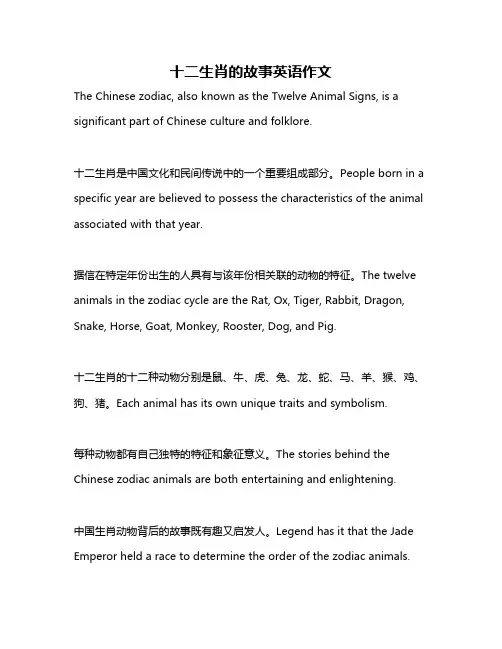
十二生肖的故事英语作文The Chinese zodiac, also known as the Twelve Animal Signs, is a significant part of Chinese culture and folklore.十二生肖是中国文化和民间传说中的一个重要组成部分。
People born in a specific year are believed to possess the characteristics of the animal associated with that year.据信在特定年份出生的人具有与该年份相关联的动物的特征。
The twelve animals in the zodiac cycle are the Rat, Ox, Tiger, Rabbit, Dragon, Snake, Horse, Goat, Monkey, Rooster, Dog, and Pig.十二生肖的十二种动物分别是鼠、牛、虎、兔、龙、蛇、马、羊、猴、鸡、狗、猪。
Each animal has its own unique traits and symbolism.每种动物都有自己独特的特征和象征意义。
The stories behind the Chinese zodiac animals are both entertaining and enlightening.中国生肖动物背后的故事既有趣又启发人。
Legend has it that the Jade Emperor held a race to determine the order of the zodiac animals.传说玉皇大帝举办了一场比赛,以确定生肖动物的顺序。
The clever Rat won the race by hitching a ride on the back of the Ox and jumping off at the finish line, securing its place as the first animal in the zodiac.机智的鼠通过搭乘牛的背部并在终点线跳下来赢得了比赛,确立了它作为生肖中第一个动物的位置。
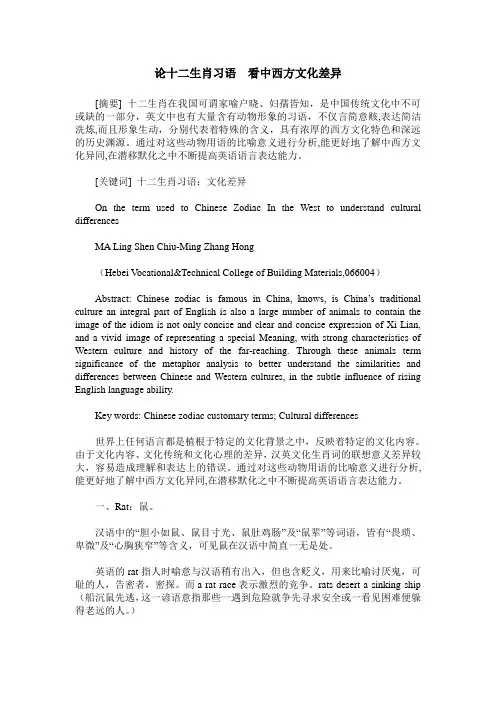
论十二生肖习语看中西方文化差异[摘要] 十二生肖在我国可谓家喻户晓、妇孺皆知,是中国传统文化中不可或缺的一部分,英文中也有大量含有动物形象的习语,不仅言简意赅,表达简洁洗炼,而且形象生动,分别代表着特殊的含义,具有浓厚的西方文化特色和深远的历史渊源。
通过对这些动物用语的比喻意义进行分析,能更好地了解中西方文化异同,在潜移默化之中不断提高英语语言表达能力。
[关键词] 十二生肖习语;文化差异On the term used to Chinese Zodiac In the West to understand cultural differencesMA Ling Shen Chiu-Ming Zhang Hong(Hebei V ocational&Technical College of Building Materials,066004)Abstract: Chinese zodiac is famous in China, knows, is China’s traditional culture an integral part of English is also a large number of animals to contain the image of the idiom is not only concise and clear and concise expression of Xi Lian, and a vivid image of representing a special Meaning, with strong characteristics of Western culture and history of the far-reaching. Through these animals term significance of the metaphor analysis to better understand the similarities and differences between Chinese and Western cultures, in the subtle influence of rising English language ability.Key words: Chinese zodiac customary terms; Cultural differences世界上任何语言都是植根于特定的文化背景之中,反映着特定的文化内容。
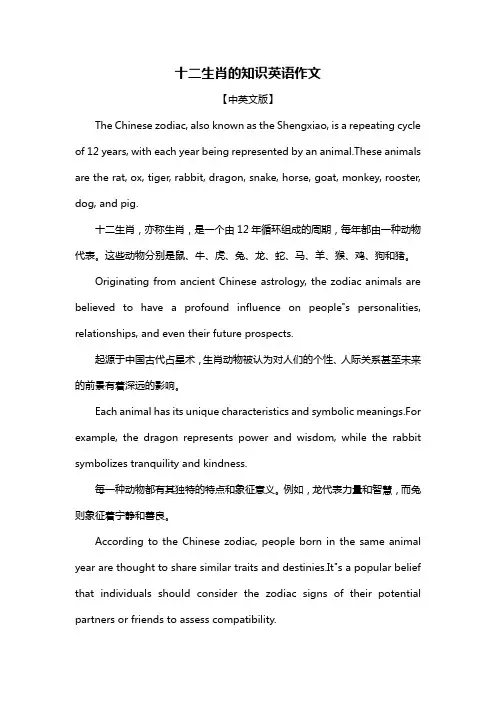
十二生肖的知识英语作文【中英文版】The Chinese zodiac, also known as the Shengxiao, is a repeating cycle of 12 years, with each year being represented by an animal.These animals are the rat, ox, tiger, rabbit, dragon, snake, horse, goat, monkey, rooster, dog, and pig.十二生肖,亦称生肖,是一个由12年循环组成的周期,每年都由一种动物代表。
这些动物分别是鼠、牛、虎、兔、龙、蛇、马、羊、猴、鸡、狗和猪。
Originating from ancient Chinese astrology, the zodiac animals are believed to have a profound influence on people"s personalities, relationships, and even their future prospects.起源于中国古代占星术,生肖动物被认为对人们的个性、人际关系甚至未来的前景有着深远的影响。
Each animal has its unique characteristics and symbolic meanings.For example, the dragon represents power and wisdom, while the rabbit symbolizes tranquility and kindness.每一种动物都有其独特的特点和象征意义。
例如,龙代表力量和智慧,而兔则象征着宁静和善良。
According to the Chinese zodiac, people born in the same animal year are thought to share similar traits and destinies.It"s a popular belief that individuals should consider the zodiac signs of their potential partners or friends to assess compatibility.根据生肖,同一年出生的人被认为拥有相似的特质和命运。
文化长廊从动物习语角度浅析中西文化差异赵静 辽宁大学外国语学院摘 要:习语是各个民族语言精华的结晶,承载着丰富的文化内涵。
由于不同的民族有着不同的历史发展背景、社会地域环境以及生活实践经验,所以对动物所赋予的文化寓意也各有不同。
本文将对英汉动物习语进行对比,探讨各种动物在中西文化内涵中的异同,以便学习者更好地了解中西文化,成功进行跨文化交际。
关键词:动物习语;中西文化;差异作者简介:赵静(1995.3-),女,汉族,山东省德州市人,现就读于辽宁大学外国语学院,硕士研究生,主要研究方向:外国语言学及应用语言学。
[中图分类号]:H08 [文献标识码]:A[文章编号]:1002-2139(2019)-08-190-01一、引言习语是一个民族经过长期使用而形成的独特的惯用表达方式。
任何一种语言都有大量的习语,与动物相关的习语更是被广泛应用。
在中国有一个成语叫做 “对牛弹琴”,不同文化中存在着与此相似的表达。
比如,在英语国家叫做“在猪面前撒珍珠( To cast pearls before swine.)”;在西班牙叫做“喂驴吃蜜( To give honey to donkeys.)”;在日本则是“送钱给猫( To give coins to cats.)”。
由此可见,与动物相关的习语在人类语言中扮演着重要的角色。
然而,由于不同民族在生活环境、风俗习惯等方面的差异,使得语言中的动物习语被赋予了独特的民族特色和地域色彩。
本文将以常见的动物习语为例,从英汉习语完全一致、部分一致、完全不一致等三个方面对动物习语进行分析。
二、动物习语比较2.1 完全一致——动物喻体相同,文化喻义相同人们从动物的基本属性去认识动物,思想认识上存在着一定的共性,自然而然会产生相同或相似的联想,赋予某种动物相同或相似的象征意义和文化内涵。
例如,英汉语中都用以下动物来比喻人类的某些特征,狐狸比喻阴险狡猾,as cunning as a fox(如狐狸般狡猾);羔羊比喻乖巧温驯,as gentle as a lamb(温柔如羔羊);蜜蜂比喻勤劳忙碌,as busy as a bee(像蜜蜂一样忙碌)。
Have you ever been asked by your Chinese friend, " What is your zodiac sign?" Don't think they are making small talk. If you say, " I'm a Monkey, " They immediately know You are either 24, 36, 48 or 60 years old.你有没有被中国朋友问过“你的生肖是什么?”不要以为他们只是寒暄,如果你说:“我属猴”他们马上,就可以知道,你多大年纪。
24,36,48或者60。
(Laughter)Asking a zodiac sign is a polite way of asking your age.By revealing your zodiac sign, you are also being evaluated. Judgments are being made about your fortune or misfortune, your personality, career prospects and how you will do in a given year.问生肖是问年龄的礼貌方式,知道了你的生肖,还可以对你进行评估。
可以预测你幸运与否,你的性格,职业前景,接下来一年的运势走向。
If you share you and your partner's animal signs, they will paint a picture in their mind about your private life. Maybe you don't believe in the Chinese zodiac. As a quarter of the world population is influenced by it, you'd be wise to do something about that.如果你分享了你和爱人的生肖,甚至可以想象你的私人生活。
十二生肖艺术文学象征意义英语作文(中英文实用版)The Chinese zodiac, a12-year cycle of animals, is not only a popular way to categorize birth years but also a rich repository of cultural symbolism in the realm of art and literature.Each of the twelve animals embodies unique characteristics and carries profound meanings that have been woven into the fabric of Chinese artistic and literary expressions throughout history.十二生肖,一个十二年的动物循环,不仅是划分出生年份的一种流行方式,也是艺术和文学领域中丰富的文化象征宝库。
十二生肖中的每一个动物都拥有独特的特质,并承载着深远的象征意义,这些意义贯穿于中国历史中的艺术和文学作品。
Innovative artists often draw inspiration from the Rat"s intelligence and resourcefulness, crafting intricate paintings and sculptures that capture the animal"s cunning essence.For writers, the Rat symbolizes wisdom and prosperity, frequently featuring in folktales and poems as a cunning hero or a harbinger of good fortune.创新艺术家们常从鼠的智慧和机智中汲取灵感,创作出捕捉到这种动物狡黠本质的复杂绘画和雕塑。
十二生肖的象征意义英语作文The Chinese Zodiac, also known as the Shengxiao, is a unique and fascinating system of representing the years in a twelve-year cycle. Each year corresponds to a specific animal from the zodiac, and each animal is associated with unique symbolic meanings and characteristics. These animals are the Rat, Ox, Tiger, Rabbit, Dragon, Snake, Horse, Goat, Monkey, Rooster, Dog, and Pig.The Rat, the first animal in the zodiac, symbolizes intelligence, cunning, and adaptability. Rats are known for their ability to survive in various environments and for their quick wit. The Ox, on the other hand, represents hard work, patience, and reliability. Oxen are known for their strength and willingness to work tirelessly.The Tiger, the symbol of courage, strength, and leadership, is renowned for its ferocity and majesty. Tigers are often associated with power and authority. The Rabbit, on the contrary, stands for gentleness, kindness, and peace. Rabbits are known for their soft nature andtheir ability to create harmony.The Dragon, a mythical creature, represents power, wisdom, and good luck. Dragons are often associated with royalty and divinity in Chinese culture. The Snake, on the other hand, symbolizes transformation, healing, and wisdom. Snakes are often seen as symbols of rebirth and renewal.The Horse, a symbol of freedom, speed, and strength, represents the spirit of adventure and the pursuit of dreams. Horses are known for their speed and endurance. The Goat, on the contrary, represents gentleness, patience, and creativity. Goats are often associated with art and culture. The Monkey, a symbol of wit, cleverness, and adaptability, represents intelligence and playfulness. Monkeys are known for their mischievous nature and their ability to adapt to various situations. The Rooster, on the other hand, stands for punctuality, honesty, and hard work. Roosters are often associated with the start of a new day and the beginning of new opportunities.The Dog, a symbol of loyalty, friendship, and bravery, represents faithfulness and protection. Dogs are known for their devotion to their owners and their willingness to sacrifice for those they love. Finally, the Pig, a symbolof wealth, fortune, and fertility, represents prosperityand abundance. Pigs are often associated with luck and good fortune.The Chinese Zodiac not only provides a unique way of representing the years but also offers insights into the values and beliefs of Chinese culture. Each animal represents a different aspect of human nature and serves as a reminder of the qualities we should strive to cultivatein ourselves. As we journey through life, the symbols ofthe Chinese Zodiac can guide us and inspire us to become better versions of ourselves.**十二生肖的象征意义**中国生肖,也称为生肖,是一种独特且迷人的系统,用十二年一个周期来代表年份。
介绍生肖内容标题英文作文## Chinese Zodiac: A Cultural Phenomenon。
The Chinese zodiac, also known as the shengxiao, is a repeating cycle of twelve years, with each year being represented by a different animal. The twelve animals are: rat, ox, tiger, rabbit, dragon, snake, horse, goat, monkey, rooster, dog, and pig.The Chinese zodiac is thought to have originated during the Han dynasty (206 BC 220 AD). According to legend, the Jade Emperor held a race to choose the twelve animals that would represent the zodiac. The rat, being the cleverest, tricked the other animals and won the race. The ox, being the strongest, came in second. The tiger, being the fastest, came in third. And so on.The Chinese zodiac is used to determine a person's personality, fortune, and destiny. It is also used to choose auspicious dates for weddings, births, and otherimportant events.## 生肖简介。
Chinese HoroscopesChinese zodiac is a scheme that relates each year to an animal and its reputed attributes, according to a 12 year cycle mathematical rather than the western linear concept of time.RatIt represents that you are imaginative,charming,and truly generous to the person you love.OxAs an ox,you are patient,your endurance will also bring you great success .also,you are easily angered.TigerThe Tiger is courageous and aggressive but is also sensitive(易受伤害的) when it comes to love ones .they are known for their playful personality.RabbitYou are the kind of person, that people like to be around.and you are always obliging and pleasant.DragonIf you are a dragon,you are one of the most powerful signs.you display the outmost amount of energy .you are the sign that has the longest lift and good fortune.SnakeYou are rich in wisdom and charm, romantic and deep thinking .As well,you should be aware of your good looks.HorseWhile you're intelligent and friendly, your capacity for hard work is amazing.you are independent.SheepYou strive(奋斗) for peace and hamony(和睦).when it comes to leadership you couldmbe quiet timid,however,you will always live a very comfortable life. MonkeyIf you are a Monkey,you are naughty,you are intelligent and clever.RoosterYou are deep thinking and very talented. A hard worker you are also someone who does not have too many friends. You maybe a bit of a loner,but you care very deeply for the friends you do have.DogYou are honest. friendly and faithful to those you love.PigYou are quiet, sincere, tolerant and honest. However, you are always well informed. And you are very trustworthy with the ones you do have.Western HoroscopesAries (3.21-4.19)Forceful, energetic,direct, courageous,enthusiastic,impulsive,generous.Taurus (4.20-5.20)Often Skeptical and stubborn ,loves serenity and inner peace.Gemini (5.21-6.21)Communicative,curious, perceptive,smart and lively,fickle,double character. Cancer (6.22-7.22)Introspective ,emotional ,protective and wants inner and outer security.Leo(7.23-8.22)Confidence and overconfidence.Virgo (8.23-9.22)Analytical, critical, modest,helpful and works toward perfection.Libra (9.23-10.23)Extrovert and active .Affectionate ,tolerant,ofen indecisive appreciates beauty,and seeks balance,relationship,and calmness.Scorpio (10.24-11.22)Penetrating,suspicious,introspective,and desires to transform and remove outer masks.Sagittarius (11.23-12.21)Extroverted(外向性的,好社交的) open minded. loves freedom and seeks meaning and new experience.Capricornus (11.22-1.19)Industrious,practical,disciplined, and works for solitude(孤单) and personal integrity.Aquarius (1.20-2.18)Innovation, Rebellion,seek to prevail over others.Pisces (2.19-3.20)Imaginative. Other worldly,impressionable, and seeks transcendence of ck of ego-strength.。
本科生毕业设计(论文)封面( 2016 届)论文(设计)题目作者学院、专业班级指导教师(职称)论文字数论文完成时间大学教务处制英语原创毕业论文参考选题(200个)一、论文说明本写作团队致力于英语毕业论文写作与辅导服务,精通前沿理论研究、仿真编程、数据图表制作,专业本科论文3000起,具体可以联系qq 805990749。
下列所写题目均可写作。
部分题目已经写好原创。
二、原创论文参考题目1、(英语毕业论文)社会因素对汉语中英语外来词的影响(开题报告+论文+文献综述)2、(英语毕业论文)《月亮与六便士》中查尔斯•思特里克兰德的追寻自我3、(英语毕业论文)《月亮与六便士》中查尔斯•思特里克兰德的追寻自我4、(英语毕业论文)从《京华烟云》探析林语堂的女性观5、(英语毕业论文)《乞力马扎罗的雪》中的象征手法解析(开题报告+论文)6、(英语毕业论文)浅析《觉醒》中艾德娜自杀的必然性7、(英语毕业论文)童话世界里的诗意与纯美—赏析奥斯卡王尔德的《夜莺与玫瑰》(开题报告+论文)8、(英语毕业论文)现代人对超人的需求--超人形象演变综述9、(英语毕业论文)跨文化商务谈判中的语用原则分析(开题报告+论文)10、(英语毕业论文)《玻璃动物园》中的逃避主义解读(开题报告+论文)11、(英语毕业论文)On the Linguistic Features of English and Chinese News Headlines12、(英语毕业论文)从Salsa舞解析墨西哥人的性格(开题报告+论文)13、(英语毕业论文)论中英思维方式差异对主语翻译的影响14、(英语毕业论文)《月亮与六便士》中查尔斯•思特里克兰德的追寻自我15、(英语毕业论文)A Feministic Study of the Theme of “The Chrysanthemums”(开题报告+论文+文献综述)16、(英语毕业论文)功能目的论视角下汉语商标的英译策略(开题报告+论文)17、(英语毕业论文)Language Features and Translation Skills of Business English Contract18、(英语毕业论文)《红楼梦》中座次表达的英译比较19、(英语毕业论文)金融英语的规范性及翻译策略研究(开题报告+论文)20、(英语毕业论文)从生态和消费的角度解读《瓦尔登湖》中梭罗的思想(开题报告+论文+文献综述)21、(英语毕业论文)关于英语课堂中教师体态语的研究22、(英语毕业论文)论中英商标翻译中的文化差异23、(英语毕业论文)增译法在《水晶宫》英译汉翻译中的应用(开题报告+论文+文献综述+外文翻译)24、(英语毕业论文)以篱笆和围墙看中西方居住文化差异25、(英语毕业论文)从认知角度看“水”的一词多义现象26、(英语毕业论文)从目的论角度研究法国香水网络广告语的汉译本的语言特征27、(英语毕业论文)对大学课程中“旅游英语”的教材分析(开题报告+论文+文献综述)28、(英语毕业论文)中英爱情隐喻的对比研究29、(英语毕业论文)《红字》中海斯特性格分析(开题报告+论文+文献综述)30、(英语毕业论文)霍桑《红字》女性主义的探析31、(英语毕业论文)试用标记模式理论分析广告语中的语码混用现象(开题报告+论文+文献综述)32、(英语毕业论文)从文化角度谈动物习语的翻译33、(英语毕业论文)车贴中的语言污染现象研究(开题报告+论文)34、(英语毕业论文)中国皮钦语的产生和发展35、(英语毕业论文)对非英语专业大学生英语自主学习能力的调查(开题报告+论文+文献综述)36、(英语毕业论文)情感教学在初中英语课堂中的理论和实践(开题报告+论文+文献综述)37、(英语毕业论文)简论爱伦•坡的建筑意象(开题报告+论文)38、(英语毕业论文)《名利场》中女性命运对比(开题报告+论文+文献综述)39、(英语毕业论文)A Comparison between Two Chinese Versions of Uncle Tom’s Cabin40、(英语毕业论文)Symbolism in The Catcher in the Rye41、(英语毕业论文)《月亮与六便士》中查尔斯•思特里克兰德的追寻自我42、(英语毕业论文)《尤利西斯》与《春之声》中意识流手法的不同43、(英语毕业论文)从美学角度评张培基先生所译散文“巷”(开题报告+论文+文献综述)44、(英语毕业论文)从奈达的动态对等理论比较研究《德伯家的苔丝》的两个中文译本(开题报告+论文+文献综述)45、(英语毕业论文)中西方礼貌原则及其差异对比研究46、(英语毕业论文)哥特元素在《宠儿》中的运用(开题报告+论文)47、(英语系经贸英语)论苹果公司的撇脂定价策略48、(英语毕业论文)从目的论看电影《音乐之声》中对白的汉译(开题报告+论文)49、(英语毕业论文)高中英语听、说、读教学活动中写作融入模式的初探(开题报告+论文+文献综述)50、(英语毕业论文)An Analysis of Racism in Of Mice and Men(开题报告+论文+文献综述)51、(英语毕业论文)英汉味觉词“酸甜苦辣”的比较分析(开题报告+论文)52、(英语毕业论文)从《芒果街上的小屋》透视女性自我意识的觉醒(开题报告+论文)53、(英语毕业论文)Cultural Differences Between English and Chinese by Analyzing Brand Names54、(英语毕业论文)对比分析中美可乐广告中的文化差异(开题报告+论文)55、(英语毕业论文)从女性主义视角浅析《纯真年代》中两位女主人公爱情观的不同(开题报告+论文)56、(英语毕业论文)On Symbolism in D.H. Lawrence’s The Rainbow(开题报告+论文+文献综述)57、(英语毕业论文)中国旅游指南的中译英研究(开题报告+论)58、(英语毕业论文)《白鲸》主人公亚哈的悲剧性格分析(开题报告+论文+文献综述)59、(英语毕业论文)解读《爱玛》中的女性主体意识(开题报告+论文)60、(英语毕业论文)目的论视角下新闻标题汉译英研究(开题报告+论文)61、(英语毕业论文)A Research of Translation of English Songs into Chinese by Poetic Norms(开题报告+论文)62、(英语毕业论文)从艾米莉•狄金森与李清照的诗歌看女性文化差异(开题报告+63、(英语毕业论文)功能翻译理论关照下的英汉商标翻译64、(英语毕业论文)透过《德伯家的苔丝》看哈代托马斯的宗教观(开题报告+论文)65、(英语毕业论文)姚木兰和郝思嘉的女性意识对比分析66、(英语毕业论文)从《悲悼三部曲》看尤金•奥尼尔对古希腊悲剧的继承性超越67、(英语毕业论文)英汉化妆品说明书对比及汉译策略(开题报告+论文+文献综述+外文翻译)68、(英语毕业论文)言语行为理论视角下口语交际误解现象69、(英语毕业论文)《永别了武器》中战争对人类所造成的毁灭(开题报告+论文+文献综述)70、(英语毕业论文)浪漫和现实冲突下的宿命论思想——赏析欧·亨利的《命运之路》71、(英语毕业论文)女性主义视角下《傲慢与偏见》的情态意义解读72、(英语毕业论文)浅析《库珀尔街》中英语过去时的翻译(开题报告+论文+文献综述+外文翻译)73、(英语毕业论文)An Analysis of Vanity Fair from the Perspective of Interpersonal Function(开题报告+论文+文献综述)74、(英语毕业论文)从输出原理探讨非英专业英语口语活动的设计75、(英语毕业论文)论科技英语翻译中科学性与艺术性的和谐统一(开题报告+论文)76、(英语毕业论文)Hardy’s View of feminism from Sue Bridehead in Jude the Obscure(开题报告+论文+文献综述)77、(英语毕业论文)浅析《德伯家的苔丝》中的象征色78、(英语毕业论文)《月亮与六便士》中查尔斯•思特里克兰德的追寻自我79、(英语毕业论文)从《傲慢与偏见》看简•奥斯丁的婚姻观(开题报告+论文)80、(英语毕业论文)顺句驱动原则下英汉同声传译中英语非动词转换为汉语动词的研究(开题报告+论文+文献综述+外文翻译)81、(英语毕业论文)从《道连•格雷的画像》看唯美主义82、(英语毕业论文)汉英亲属称谓词的文化差异及翻译(开题报告+论文+文献综83、(英语毕业论文)从核辐射报道看英国报纸行文的语言特征84、(英语毕业论文)解读《欲望号街车》中的女主人公布兰琪85、(英语毕业论文)《月亮与六便士》中查尔斯•思特里克兰德的追寻自我86、(英语毕业论文)紧身胸衣和缠足:十八世纪欧洲和中国女性的社会角色解释87、(英语毕业论文)《劝导》中安妮•艾略特的道德判断(开题报告+论文+文献综述)88、(英语毕业论文)合作学习法对英语口语能力的影响——对独立学院非英语专业学生的个案研究89、(英语毕业论文)《月亮与六便士》中查尔斯•思特里克兰德的追寻自我90、(英语毕业论文)The Interpretation to Captain Ahab in Moby Dick through Abnormal Psychology91、(英语毕业论文)从《厄舍古屋的倒塌》看爱伦坡写作的哥特式风格(开题报告+论文)92、(英语毕业论文)《月亮与六便士》中查尔斯•思特里克兰德的追寻自我93、(英语毕业论文)论《茶花女》中女主人公玛格丽特的女性魅力在男权主义下的体现94、(英语毕业论文)Discourse Analysis on the Translation of Person of the Year, an Editorial in the Time Magazine95、(英语毕业论文)《月亮与六便士》中查尔斯•思特里克兰德的追寻自我96、(英语毕业论文)从电视相亲节目看当代中美女性婚恋观差异(开题报告+论文+文献综述)97、(英语毕业论文)欧美电影对英语学习者英语口语的影响(开题报告+论文)98、(英语毕业论文)An Analysis of Survival of Orphans in Oliver Twist(开题报告+论文+文献综述)99、(英语毕业论文)The Language Features of Advertising English100、(英语毕业论文)电影英文片名汉译的原则(开题报告+论文+文献综述)101、(英语毕业论文)Translation Strategies of Chinese-specific Idioms102、(英语毕业论文)中西方婚礼礼服颜色的对比研究(开题报告+论文)103、(英语毕业论文)心灵的挣扎:浅析福克纳短篇小说《烧马棚》中萨蒂的困境(开题报告+论文+文献综述)104、(英语毕业论文)从功能对等角度分析英文电影片名汉译105、(英语毕业论文)礼貌原则框架下化妆品广告语篇研究(开题报告+论文)106、(英语毕业论文)论《重返巴比伦》中女性的身份的自我建构(开题报告+论文)107、(英语毕业论文)性格、学习策略和英语学习成绩的关系研究108、(英语毕业论文)《黄鹤楼》五个英译本的语义等值研究(开题报告+论文+文献综述+外文翻译)109、(英语毕业论文)《恋爱中的女人》欧秀拉和古迪兰的性格对其爱情观的影响(开题报告+论文)110、(英语毕业论文)论初中英语教学中的任务型教学法111、(英语毕业论文)On the Influence of Social Environment on Pip’s Growth in Great Expectation(开题报告+论文+文献综述)112、(英语毕业论文)简•奥斯汀《诺桑觉寺》中人物对爱情和婚姻的不同态度(开题报告+论文+文献综述)113、(英语毕业论文)功能对等角度下《最后一片叶子》的翻译策略(开题报告+论文+文献综述)114、(英语毕业论文)简•奥斯汀《曼斯菲尔德庄园》中女性角色的地位分析(开题报告+论文)115、(英语毕业论文)中西方数字“九”的文化对比分析与翻译116、(英语毕业论文)《周六夜现场》的幽默剖析117、(英语毕业论文)报刊广告英语的文体特色分析118、(英语毕业论文)《紫色》中“家”的解读(开题报告+论文+文献综述)119、(英语毕业论文)英国议会制辩论--探究与实践120、(英语毕业论文)拒绝话语跨空间映射的认知解读—以商务洽商为例(开题报告+论文+文献综述+外文翻译)121、(英语毕业论文)《西游记》和《哈利波特》的对比122、(英语毕业论文)从女性主义视角分析《纯真年代》中两位女主人公的不同爱情观(开题报告+论文+文献综述)123、(英语毕业论文)英汉鸟类词汇文化内涵比较(开题报告+论文)124、(英语毕业论文)化学专业学生英语阅读策略研究(开题报告+论文)125、(英语毕业论文)《月亮与六便士》中查尔斯•思特里克兰德的追寻自我126、(英语毕业论文)语境顺应视角下英语情景喜剧中幽默字幕翻译--以《生活大爆炸》为例(开题报告+论文)127、(英语毕业论文)教师在初中教学中对学生的评价128、(英语毕业论文)《红色英勇勋章》主人公亨利•弗莱明心路历程探析(开题报告+论文)129、(英语毕业论文)从道德角度分析简•奥斯丁《劝导》中的女主人公安妮•艾略特(开题报告+论文+文献综述)130、(英语毕业论文)哈金小说《等待》中的女性悲剧分析(开题报告+论文)131、(英语毕业论文)论《失乐园》中撒旦的形象及象征意义132、(英语毕业论文)浅谈商务英语于商务信函中的运用(开题报告+论文+文献综述)133、(英语毕业论文)探析《呼啸山庄》男女主人公爱情悲剧的根源(开题报告+论文+文献综述)134、(英语毕业论文)Pragmatic Study on the Humor Effect in The Big Bang Theory(开题报告+论文+文献综述)135、(英语毕业论文)初中英语教学中的角色扮演(开题报告+论文+文献综述)136、(英语毕业论文)从许渊冲“三美论”评析《声声慢》三个译本(开题报告+论文+文献综述+外文翻译)137、(英语毕业论文)以“三美论”对比《登高》两个英译版本的“意美”与“音美”(开题报告+论文+文献综述+外文翻译)138、(英语毕业论文)英汉谚语中“爱”的情感隐喻对比研究(开题报告+论)139、(英语毕业论文)李白对庞德和他的作品的影响140、(英语毕业论文)从成长小说角度解读《马丁•伊登》141、(英语毕业论文)Application of Foregrounding Theory to Translation of Simile and Metaphor142、(英语毕业论文)论接受理论对儿童文学作品的影响——以《快乐王子》中译本为例(开题报告+论文)143、(英语毕业论文)跨文化视角下中西方选秀文化对比研究——以达人秀为例(开题报告+论文)144、(英语毕业论文)电影《少年派的奇幻漂流》中的隐喻分析(开题报告+论文)145、(英语毕业论文)跨文化交际中的语用失误分析及策略研究(开题报告+论文)146、(英语毕业论文)中美电影文化营销的比较研究(开题报告+论文)147、(英语毕业论文)An Analysis of the Tragic Fate of Mary Turner in The Grass Is Singing148、(英语毕业论文)《月亮与六便士》中查尔斯•思特里克兰德的追寻自我149、(英语毕业论文)在孤独中寻找自我——析《没有指针的钟》J.T.马龙的救赎150、(英语毕业论文)关于英语课堂中教师体态语的研究151、(英语毕业论文)Rabbit’s Predicament and Dreamland152、(英语毕业论文)功能对等理论视角下李白诗歌中意象的英译(开题报告+论文)153、(英语毕业论文)Preciseness of Legal English154、(英语毕业论文)“It be Adj of sb to do sth”中形容词语义的构式语法研究(开题报告+论文+文献综述+外文翻译)155、(英语毕业论文)Feminism in To the Lighthouse156、(英语毕业论文)浅析欧•亨利小说中恶棍骗子形象塑造--以《双料骗子》,《提线木偶》为例157、(英语毕业论文)对抗还是和谐——论《白鲸》人与自然的关系(开题报告+论文)158、(英语毕业论文)A Comparative Study of the Character of Tess and Jane Eyre(开题报告+论文+文献综述)159、(英语毕业论文)The Glossology and Translation of Rhetorical Devices of Harry Potter160、(英语毕业论文)《月亮与六便士》中查尔斯•思特里克兰德的追寻自我161、(英语毕业论文)《格列佛游记》中格列佛的人格探析(开题报告+论文)162、(英语毕业论文)浅析《还乡》中爱格敦荒原的象征意义(开题报告+论文+文献综述)163、(英语毕业论文)《哈克贝利•费恩历险记》的艺术特色分析164、(英语毕业论文)从基因学的角度看多义词的词义关系(开题报告+论文+文献综述+外文翻译)165、(英语毕业论文)浅谈《圣经》对英语习语的影响166、(英语毕业论文)《蝴蝶梦》中的女性成长主题研究(开题报告+论文)167、(英语毕业论文)影响二语习得的因素--案例研究168、(英语毕业论文)论《最后的莫西干人》中的印第安情结(开题报告+论文)169、(英语毕业论文)学习动机对大学生英语学习的影响(开题报告+论文+文献综述)170、(英语毕业论文)从心理分析角度分析《屋顶丽人》中汤姆的升华(开题报告+论文)171、(英语毕业论文)英语动结式V+PP的语义整合研究(开题报告+论文+文献综述+外文翻译)172、(英语毕业论文)《月亮与六便士》中查尔斯•思特里克兰德的追寻自我173、(英语毕业论文)基于微博(推特)文化的新型营销模式(开题报告+论文+文献综述)174、(英语毕业论文)《月亮与六便士》中查尔斯•思特里克兰德的追寻自我175、(英语毕业论文)Colonialist Ideology in The Last of the Mohicans(开题报告+论文+文献综述)176、(英语毕业论文)任务型教学模式在初中英语课堂教学中的现状分析--以xx 学校初一学生为例(开题报告+论文)177、(英语毕业论文)An Analysis of Feminism in Little Women(开题报告+论文+文献综述)178、(英语毕业论文)中英文姓名的文化内涵及其翻译的对比研究(开题报告+论文+文献综述)179、(英语毕业论文)Thackeray’s Ambivalent Attitude towards the Women in Vanity Fair180、(英语毕业论文)从语用角度探讨汉译英公示语181、(英语毕业论文)《呼啸山庄》中哥特式特征探析182、(英语毕业论文)《永别了,武器》中主人公亨利形象分析183、(英语毕业论文)The Interpretation to Captain Ahab in Moby Dick through Abnormal Psychology184、(英语毕业论文)解析《宠儿》的象征意义(开题报告+论文)185、(英语毕业论文)托尼•莫里森《秀拉》中的女性主义(开题报告+论文)186、(英语毕业论文)解读罗伯特•彭斯的爱情观——以《一朵红红的玫瑰》和《约翰•安德生,我的爱人》为例187、(英语毕业论文)礼貌原则视角下奥巴马演讲技巧的分析(开题报告+论文)188、(英语毕业论文)肢体语言在商务谈判中的应用与作用189、(英语毕业论文)《智血》中主要人物生命历程解读(开题报告+论)190、(英语毕业论文)海明威短篇小说的叙述艺术--以《一个明亮干净的地方》为例191、(英语毕业论文)从历届美国总统访华演说探讨其对中国所传递的价值观(开题报告+论文+文献综述)192、(英语毕业论文)《月亮与六便士》中查尔斯•思特里克兰德的追寻自我193、(英语毕业论文)从关联理论角度看电影台词翻译—电影“小屁孩日记”的个案研究194、(英语毕业论文)“黑尔舍姆”教育尝试的失败—析石黑一雄小说《别让我走》(开题报告+论)195、(英语毕业论文)从词汇对等角度看《红楼梦》中“笑”一词的英译(开题报告+论文)196、(英语毕业论文)高中英语新课标在xx中实施情况调查与分析(开题报告+论文)197、(英语毕业论文)浅析《野性的呼唤》中的“野性”与“人性”198、(英语毕业论文)An Application of Schema Theory in Interpreting199、(英语毕业论文)《老人与海》和《热爱生命》的生态比较(开题报告+论文+文献综述)200、(英语毕业论文)对《老人与海》中圣地亚哥的性格分析。